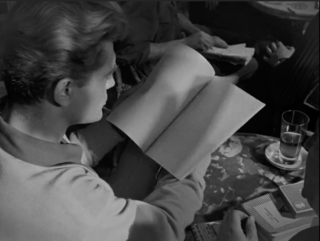Blank Pages
Gill Partington
On Wednesday, Donald Trump tweeted a series of photographs with the caption: ‘Kayleigh McEnany presenting Lesley Stahl with some of the many things we’ve done for Healthcare.’ The pictures showed his press secretary handing some papers and a hefty volume to the 60 Minutes reporter, just before an interview which the president cut short acrimoniously. As many Twitter users were quick to point out, one of the images showed Stahl opening the book and peering inside at an apparently blank page. Had the book been mocked up for the purposes of the interview, embodying not only the lack of an actual health policy, but also the fakery and pretence at the heart of the administration? Others responded that the absence of text proved nothing, since it could have been a flyleaf or title page: ‘Haven’t you ever read a book?’
It wouldn’t be the first time that Trump has used blank pages for rhetorical effect. At a press conference in 2017, he announced he had handed over the management of his businesses to his sons to avoid any conflict of interest, gesturing to a table full of unlabelled manila folders containing what looked very much like empty sheets of paper (journalists weren’t allowed to open the folders). At another photo opportunity, he posed in front of teetering stacks of blank printer paper, wrapped in red tape, representing the unnecessary bureaucratic paperwork he intended to cut back. More recently, he’s been caught out signing blank sheets for the cameras, pretending to work while in hospital. If Trump’s style of presidency belongs to the screen age of social media, it has often tried to deploy paper as a physical guarantor of old-fashioned seriousness.
But if the intention in giving the giant book to Stahl was to make Trump’s frequently promised but ever elusive healthcare plan seem more concrete, it had the opposite effect, serving only to complicate the layers of fakery and reality. If the book was blank, did that mean it was simply a dummy, a prop created for the cameras? Did it mean it wasn’t a real book at all? It’s an intriguing question. At the beginning of Jean Cocteau’s Orpheé (1949), the protagonist leafs derisively through a hot new literary journal, giving viewers a sight of its pages, which are entirely blank. The punchline is its title: Nudisme. The book is doubly unreal: both a film prop and a blank volume. Except that you can now buy a copy of Nudisme. The American artist Jason Fulford has published a careful facsimile of it, which you can either leave blank, or use as a notebook. It’s either more real (you can hold it in your hands) or less, since it’s a copy of a fake book. Take your pick.
Tristram Shandy has a blank page (as well as a solid black page and a marbled page) on which Sterne encourages his readers to ‘paint’ the sensuous Widow Wadman ‘to your own mind … Thrice happy book! thou wilt have one page, at least, within thy covers, which Malice will not blacken, and which Ignorance cannot misrepresent.’ Victor David Dinnerstein’s The Wit and Wisdom of Spiro T. Agnew (1969) used the blank page for political satire. In 1976, George Maciunas, the co-ordinator of the Fluxus movement, produced Flux Paper Events, 16 blank pages whose ripped, stained condition told a story about what had happened to them. In 1998, the Dutch artist Hans Bossman made a Newspaper without News as relief from the onslaught of printed information. In Richard Kostelanetz’s Tabula Rasa: A Constructivist Novel (1978), the narrative consists of ‘the space of the printed page and the time it takes the reader to turn from one page to the next’. But Trump’s ‘healthcare plan’ may be closest to The Condensed History of Nothing (1970) by the Canadian poets bpNichol and David Aylwood, whose non-existent narrative corresponds to its subject matter. It’s a real book, it just doesn’t have any content.

Comments
A fighter embarks on a quest to challenge a wizard (played by -- who else? -- Christopher Lee) for the right to read a fabled "book of enlightenment". Eventually he finds that the pages are simply mirrors -- the wizard explaining that enlightenment can't be found in books, but only "within". The question of how to become enlightened if (like Trump) one is blank or empty within does not, of course, arise.